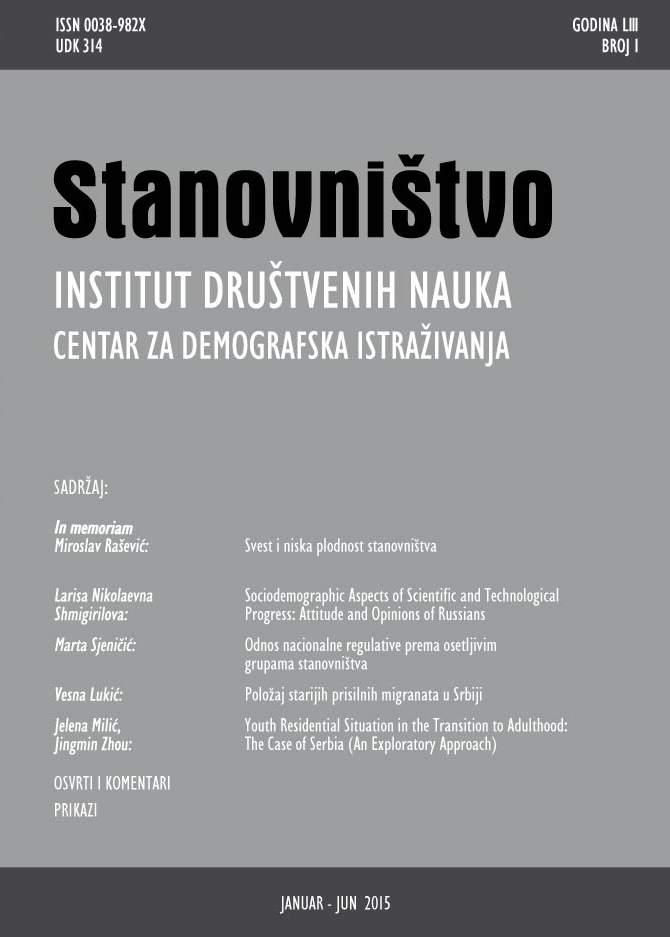Sociodemographic Aspects of Scientific and Technological Progress: Attitude and Opinions of Russians
Sociodemographic Aspects of Scientific and Technological Progress: Attitude and Opinions of Russians
Author(s): Larisa Nikolaevna ShmigirilovaSubject(s): Social Sciences, Sociology, Methodology and research technology, Social development, Human Ecology, Social Informatics, Environmental interactions
Published by: Институт друштвених наука
Keywords: scientific and technological progress; technosphere; human environment; social risks; activity area
Summary/Abstract: The degree of protection of human beings, the state, humanity, and environment from growing dangers of technology-related disasters, despite the efforts made around the world, has not increased. The threat of planetary and global nature in natural, technological and social spheres in the short term can become dominant. Natural and technology related disasters, in turn, are able to create and foster a threat in the socio-political, economic, demographic and military-strategic spheres. Russia, like other countries, is no exception.In this article the author, using examples of data of the all-Russian polls on changing the human environment innovations which provide scientific and tech-nical progress, investigates the impact assessment of the results of scientific and technical achievements, positive and negative predictions of the effects of an increasingly wide application in everyday life of high-tech products.The attempt has been made to determine a measurement of Russians' attitude towards the achievements and consequences of scientific and technological progress. On the one hand, through the measurement of the degree of influence of science and new technologies on the quality and length of life, on change of health status and environmental pollution. On the other, through the measurement of their degree of anxiety in relation to specific social threats. Two groups of threats and risks were identified: the threat of socio-economic, socio-political nature, and threats of metasocial order (problems of planetary security, natural disasters, ecology, major technological disasters, etc.).The data of the all-Russian polls conducted by various sociological centers in the last 7 years were used in the study, and the results of sociological research conducted in the framework of the project "Forecasting effort and social risks management of anthropogenic human-caused systems development over time human environment transformation processes". The research was conducted by scientists of Belgorod National Research University (Belgorod, Russia) in May 2015 by the all-Russian survey (N=120). It selected 10 regions of the Russian Federation with the maximum and minimum degree of riskogenics, as well as the type of city (with leading environmental subsystem, leading socio-cultural subsystem, and leading technology-related subsystem). This choice is justified by the idea that the living environment consists of three interrelated subsystems – natural subsystem, socio-cultural subsystem and technology-related subsystem.From a sociological point of view, this information allows us to understand how Russians are critical of the achievements of scientific-technical progress, and we can analyze their choices regarding technical innovations, as they have a culture of critical choice.In general, Russians believe that scientific and technological progress brings more good than harm to human society. However, women have the most adequate assessment regarding environmental issues, as they have a more pronounced environmental consciousness. According to Russians, the Internet and computer technology, space exploration, advances in medicine had the greatest influence among the scientific discoveries and inventions to change their lives.During the research it was found that the majority of Russians are critical of the achievements of scientific and technological progress, increasingly able to analyze their choices about technological novelties, they know the culture of critical choice. However, people are afraid of the intervention of new technologies in natural evolutionary and genetic processes. This is, in our opinion, the duality of the perception of the Russians' technological progress.
Journal: Stanovništvo
- Issue Year: 53/2015
- Issue No: 1
- Page Range: 1-18
- Page Count: 18
- Language: English

